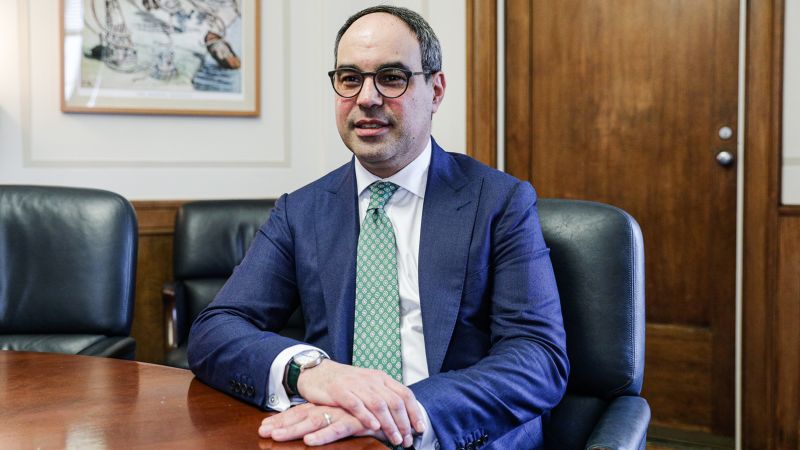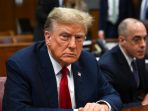CNN
—
After years of hearings, reports and stalled proposals, Congress ended 2022 without taking major steps to regulate Big Tech. But a few blocks away in Washington, Jonathan Kanter is just getting warmed up.
While the Justice Department’s top antitrust official has yet to file fresh lawsuits against any of the country’s biggest tech companies, Kanter has spent months laying the groundwork for a broader tech reckoning, arguing that changes in technology have created new opportunities for businesses to exploit monopoly power in ways courts may not yet recognize as potentially illegal.
Traditionally, antitrust enforcers have focused on how dominant companies might hurt consumers through increased prices or by reducing choices in the marketplace. But Kanter, along with his ally at the Federal Trade Commission, Chair Lina Khan, have pushed to expand the US government’s thinking, looking increasingly at the sophisticated ways businesses can use new technologies to gain an anticompetitive advantage.
That includes the use of “dark patterns,” software interface designs meant to nudge consumers toward making a company’s preferred choice, Kanter told CNN in an interview last month.
“Economic realities have shifted,” Kanter said. “Some of the interaction between companies and consumers now is personalized and targeted. [Antitrust] has to take into account how consumers react to dark patterns; how companies can affect the behavior of consumers; how they can extract value, consumers’ attention, money and data.”
With Congress entering a new phase of divided partisan control, policy experts have said the outlook for tech legislation may now be even dimmer than before — making enforces like the DOJ and the FTC the likeliest sources of action going forward.
Through policy speeches, staffing changes and an ongoing revamp of the nation’s merger guidelines in partnership with the FTC, Kanter has signaled the Justice Department is preparing to go after what critics allege are some of Silicon Valley’s most anti-competitive practices. On Kanter’s watch, DOJ’s antitrust division has built out its own data science team and hired a chief economist with a background in computer science and machine learning. The agency even secured the first criminal guilty plea in decades in a rare case against an attempted monopoly.
Kanter has also proven to be an effective advocate within DOJ, said Bill Baer, a former top US antitrust official, after the Justice Department strongly endorsed a major bill in Congress that would ban Amazon from selling its own products on the marketplace it runs, among other things. “To get the Department to weigh in on a matter like that is pretty significant,” said Baer, a visiting fellow at the Brookings Institution who has led FTC and DOJ antitrust work in two presidential administrations.
With these moves, Kanter could help kick off a new era of antitrust enforcement that sees more lawsuits against more household names, and more pressure for businesses to rethink everyday practices that shape the way many consumers use online products. As he enters his second year in office, some of those efforts are now poised to bear fruit. Within the next few months, Kanter said, the FTC and DOJ will release a public draft of the updated merger guidelines, a document that broadly outlines the types of acquisitions likeliest to invite US government challenges.
Those guidelines may, for the first time, explicitly cover some of the ways tech giants have been accused of throwing their economic weight around, from using their enormous scale to offer must-have apps, devices and services for free or even at a loss to quickly amass market share, to gobbling up startup companies that could someday threaten their dominance.
Much of the tech industry’s competition-related criticism has focused on Meta and its acquisitions of Instagram and WhatsApp; Amazon and its relationship to third-party sellers; or Google and its dominance in online advertising. But it’s increasingly spread to other areas of the digital economy, too, including Apple’s app store policies and Ticketmaster’s grip on live events, after a chaotic ticketing debacle involving Taylor Swift’s latest concert tour. Both are said to be the subject of ongoing DOJ probes.
Kanter declined to comment on either matter. But his track record so far, including on non-tech issues, suggests the door is wide open to high-profile lawsuits against some of the country’s most visible companies.
Kanter is no stranger to tech issues. After spending the early part of his career as an FTC attorney, Kanter went on to represent clients including Microsoft and Yelp, a longtime critic of Google. (The search giant is currently defending a DOJ antitrust suit brought under the Trump administration; the case has prompted some critics to call for Kanter’s recusal. DOJ declined to comment on the matter.)
Together with Khan — who wrote a 2017 law paper on Amazon that helped kickstart a debate about its power — Kanter represents the new face of antitrust enforcement in Washington. They reflect vocal commitments by the Biden administration to hold powerful companies accountable.
The tech industry, for its part, has broadly defended itself against allegations of anticompetitive behavior, and emphasized how its products have benefited small businesses and consumers. And it’s warned that the antitrust legislation endorsed by the DOJ could lead to unintended consequences such as higher prices or the loss of useful product features consumers enjoy.
As part of his effort to shake up traditional orthodoxy, Kanter has pushed to bring more cases to trial, as well as cases that test the bounds of the law. It’s a more aggressive posture that seeks to adapt decades-old jurisprudence to what Kanter says are new market conditions in a modern economy.
One of DOJ’s top accomplishments of the past year, according to Kanter and outside antitrust experts, is the agency’s decisive court victory over a $2.2 billion merger involving the book publishers Penguin Random House and Simon & Schuster, which would have combined two of the so-called Big Five in the industry.
A traditional merger challenge might have focused on how eliminating one of the Big Five could negatively affect consumers, perhaps through increased book prices. But DOJ took a different tack: It primarily argued the merger would be bad for authors, who would be paid less in a market with fewer publishers competing for their labor.
Winning on that uncommon claim has effectively beefed up the powers of antitrust enforcers, who can now vigorously pursue other cases where anticompetitive behavior may arguably harm workers, according to Diana Moss, president of the American Antitrust Institute.
The Penguin case underscored how antitrust “can address competitive harm in markets anywhere in a supply chain — from workers and inputs, to middle markets, to consumers,” Moss said, adding that the decision builds on a successful Obama-era merger challenge that alleged a combination of major health insurers risked harming doctors’ pay.
Statistically, in more than 20 years of merger challenges, DOJ has only litigated to a final court decision an average of one case per year, Kanter said. By comparison, in 2022 the antitrust division was on pace to litigate more merger trials than any year on record, according to Sen. Amy Klobuchar, a Minnesota Democrat whose Senate subcommittee oversees the antitrust division.
“Our country faces a serious monopoly problem,” Klobuchar said in a statement to CNN last month. “We need antitrust enforcers who can get the job done, and leaders with the experience, legal skill, and courage to take on some of the most powerful companies the world has ever seen. Over the past year, Assistant Attorney General Kanter has consistently demonstrated these qualities.”
In another flex of agency muscle, officials in October announced they had secured what experts described as the first criminal guilty plea in roughly a half-century for attempted monopolization. Criminal charges for attempted or actual monopolization are exceptionally rare, and by invoking a little-used aspect of the law, enforcers demonstrated a commitment to using all the tools at their disposal.
The construction executive in the case, who had tried to persuade a rival to divide up a regional market for highway repairs, faces up to a $1 million fine and 10 years in prison.
Kanter’s litigious approach has resulted in some setbacks for the agency, with court defeats in several cases that some critics say cast a shadow on his get-tough agenda.
Prosecutors last year repeatedly tried and failed to convict multiple poultry industry executives in an alleged price-fixing scheme, resulting in numerous dropped charges. An attempt to block a defense industry merger also stalled, with DOJ dropping the suit after the deal closed in October. DOJ lost at the district court level while seeking to block the merger of two sugar companies, and also in the challenge of UnitedHealth Group’s acquisition of the health technology company Change Healthcare. Appeals are pending in both cases.
David Gelfand, an attorney who represented Change Healthcare at trial and a former DOJ antitrust official, said Kanter’s effort to reshape the US government’s approach to antitrust enforcement faces significant headwinds. Just as court victories can effectively cement a regulator’s authority, court losses can weaken it.
“A political appointee who runs a law enforcement agency doesn’t get to re-envision the law,” Gelfand said. “The law is what the law is. It’s been developed through decades of cases, economic work… I think all he accomplished in this case was to harden the law in an area where he would like to see it moved.”
In the interview, Kanter said it’s vital to present courts with new cases to ensure the law can keep up with the times.
“Unless we give courts the opportunity to confront new fact patterns, new issues, new economic realities that are becoming pervasive throughout the economy,” he said, “we’re never really going to have the opportunity to advance the law in a way that makes it relevant and applicable to market realities and a modern economy.”
And since some of the cases are still on appeal, it may be too soon to judge the significance of certain court losses, said Moss.
Meanwhile, the Justice Department in other cases has forced “a whole bunch of mergers to be abandoned” that would have been anticompetitive, said Baer.
Now, as the new year gets underway, Kanter faces tall expectations.
The Google case continues, while the reported probe into Apple could lead to a landmark fight over the rules that app stores can impose on software developers. A challenge against Apple would mark a significant escalation by the US government against the tech industry. Apple hasn’t commented on the possibility of a DOJ lawsuit, but it has argued that its tight control over the Apple App Store has helped consumers by enhancing their security and privacy.
In a reflection of Washington’s growing skepticism of the tech industry in recent years, Kanter has argued that the features and benefits tech companies have touted as defenses may come with hidden costs.
“Algorithms manipulate our psychology to shape our minds and our behavior, without competition for them to do so responsibly,” he said in a September speech. “With too little competition over privacy, we find our most intimate data mined and sold with abandon. The digital age is not only characterized by the presence of monopoly power, but by new means of its exploitation more threatening to individual freedom than ever before.”
Then there’s Ticketmaster. Last year’s debacle in online ticketing, which provoked outcries from Taylor Swift fans who could not purchase the musician’s concert tickets (or who were gobsmacked at resale prices listing tickets for tens of thousands of dollars) abruptly turned antitrust into a dinner-table issue. It focused intense scrutiny on the dominance of online ticketing giant Live Nation, which operates Ticketmaster. Some US lawmakers even suggested that the Justice Department may need to break up the company.
“This may be the only way to truly protect consumers, artists, and venue operators and to restore competition in the ticketing market,” wrote Klobuchar, along with Democratic Sens. Richard Blumenthal of Connecticut and Ed Markey of Massachusetts, in a November letter to Kanter and Attorney General Merrick Garland.
Some industry analysts say the heightened scrutiny from politicians increases the likelihood of a DOJ lawsuit. Cowen Inc., a market research firm, said Monday it was raising its estimated odds of an antitrust suit against Live Nation from 35% to 60%, rating it more likely than not.
Sumber: www.cnn.com






